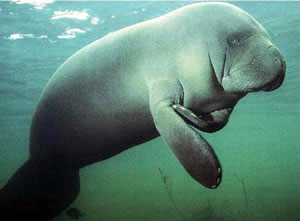Manatee
The West African Manatee (Trichechus senegalensis) is present in the west coast of Africa. Amazonian Manatee (T. inunguis) lives in the interior rivers of tropical South America, west to the Peruvian Amazon.
The West Indian Manatee (T. manatus) is present in the West Indies and the Caribbean Sea to the southern Gulf of Mexico and the northeast coast of South America to the mouth of the Amazon River. Some people consider these manatees as distinct species, but ITIS treats it as a subspecies of T. manatus, and this is now accepted. The length of the animal is 15 feet long, and it can live in both fresh and salt water. Poachers hunted this animal for its flesh and oil but now this is a protected animal.

The water control structures such as the navigation locks, floodgates,
etc sometimes crush these manatees.
Manatees like to live in warm waters so they often gather together near
power plants, which warm the waters. Some have become dependent on this
source of unnatural heat and have ceased migrating to warmer waters. Some
power plants have recently been closing and the U.S. Fish and Wildlife
Service are trying to find a new way to heat the water for these manatees.













